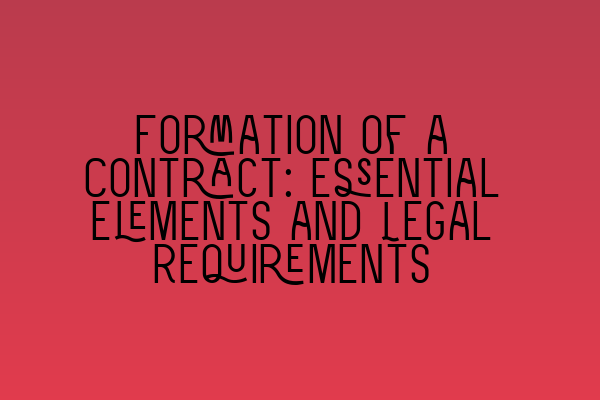Formation of a Contract: Essential Elements and Legal Requirements
Contracts are the backbone of commercial transactions and legal agreements. Whether you are a business owner, a consumer, or a professional, understanding the essential elements and legal requirements of contract formation is crucial. A properly drafted and executed contract ensures that all parties involved are bound by their agreed terms and protects their rights and interests.
1. Offer and Acceptance
At the heart of every contract is the concept of offer and acceptance. An offer is a clear and specific proposal made by one party to another, expressing a willingness to enter into a contract on certain terms. The terms of the offer must be definite and communicated effectively to the offeree.
The offeree’s acceptance must be unambiguous and correspond to the terms of the offer. It creates a binding agreement between the parties, establishing their rights and obligations. It is important to note that silence or inaction usually does not constitute acceptance.
For example, when a customer orders a product from an online retailer and pays for it, the act of payment is considered acceptance of the retailer’s offer to sell the product at the advertised price.
2. Intent to Create Legal Relations
For a contract to be valid, the parties must have a genuine intention to create legal relations. This means that they intended to be legally bound by the terms of the contract. In most commercial transactions, it is presumed that the parties intended to create legal relations. However, this may not be the case in certain social or domestic arrangements where there is a presumption of no intention to create legal relations, such as between family members or friends.
It is essential to consider the context and circumstances surrounding the agreement to determine whether the parties intended to create legal relations or not.
3. Consideration
Consideration is a fundamental element of a contract and refers to something of value exchanged between the parties. It can be in the form of money, goods, services, or a promise to do or refrain from doing something. Consideration is what each party gives or promises to give in exchange for the other party’s promise.
For example, when a business owner hires an employee and agrees to pay them a salary, the consideration is the employee’s work in exchange for the salary.
Without consideration, a promise is usually considered a mere gift and not legally enforceable. However, there are exceptions to this general rule, such as promises under seal, promissory estoppel, or statutory provisions.
4. Capacity and Consent
For a contract to be valid, the parties involved must have the legal capacity to enter into the agreement and give their consent freely and voluntarily. In other words, they must be of sound mind, of legal age, and not under any influence or duress that would affect their ability to make a rational decision.
If a party lacks capacity, such as being a minor or mentally impaired, the contract may be voidable at their option. Consent must also be free from misrepresentation, mistake, undue influence, or duress, as these factors can render the contract void or voidable.
5. Legal Formalities
In most cases, contracts do not require any specific formality to be valid and enforceable. They can be oral or written, and the terms can be expressly agreed upon or implied by conduct. However, certain contracts, such as those involving real estate, marriage, or the sale of goods, may require specific legal formalities, such as being in writing, signed, witnessed, or registered, to be valid.
Conclusion
Understanding the essential elements and legal requirements of contract formation is paramount in safeguarding your rights and interests. By ensuring there is a valid offer and acceptance, a genuine intent to create legal relations, consideration, capacity and consent, and adherence to any required formalities, you can establish a legally binding contract that protects your rights and obligations.
For further preparation for the SQE, we recommend checking out our related articles:
